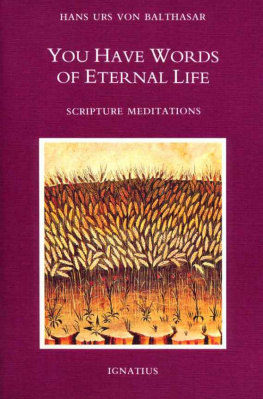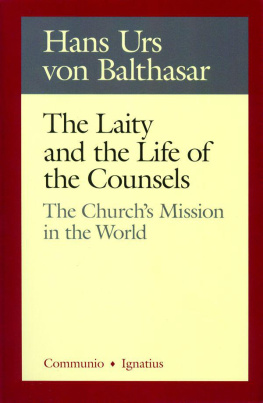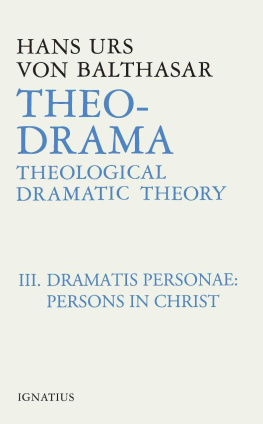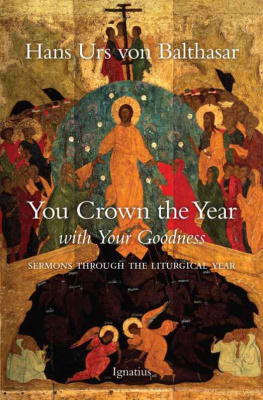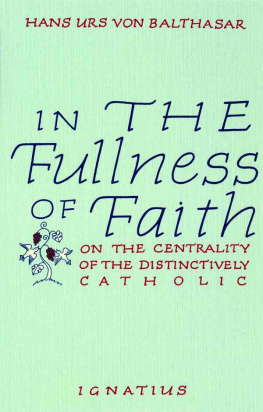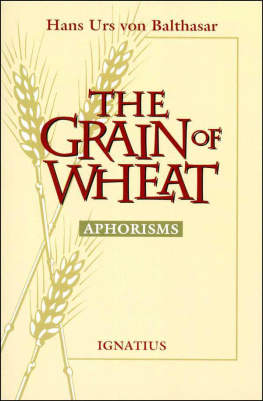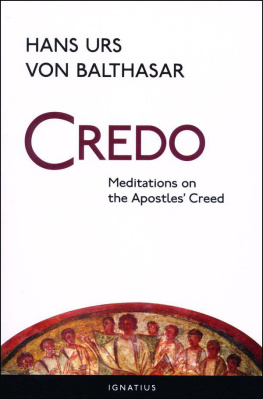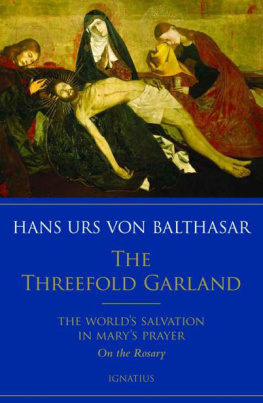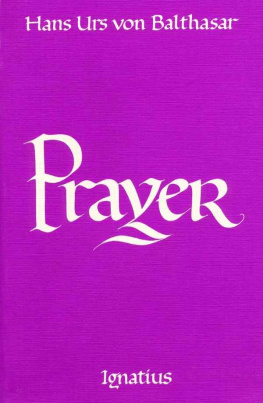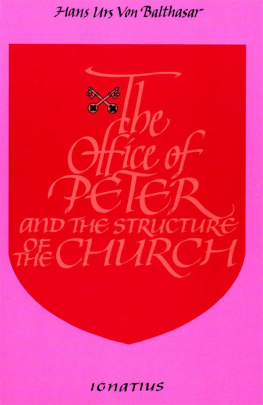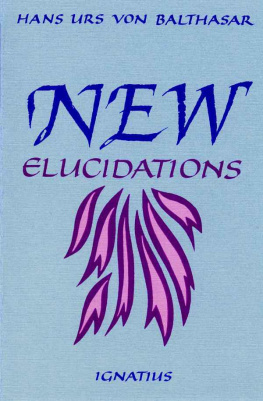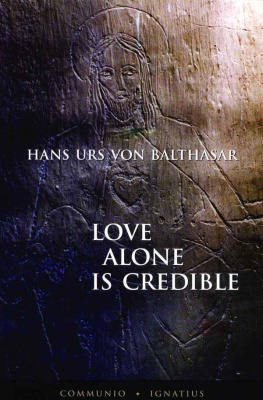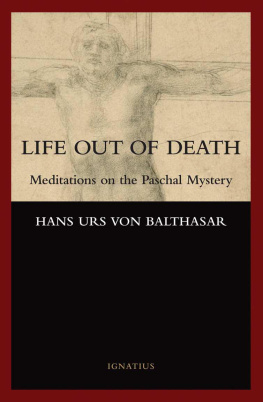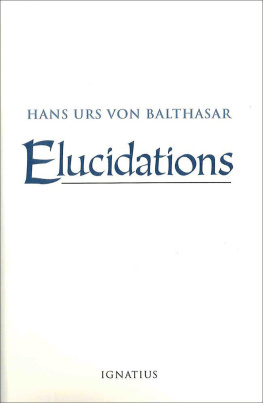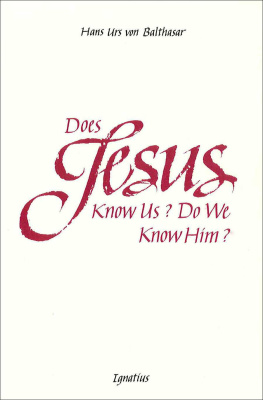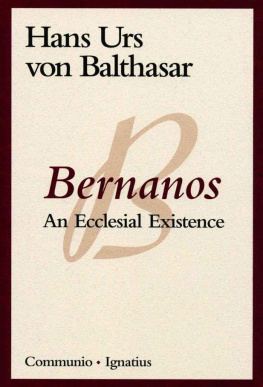HANS URS VON BALTHASAR
YOU HAVE WORDS OF ETERNAL LIFE
Hans Urs von Balthasar
YOU HAVE WORDS
OF ETERNAL LIFE
SCRIPTURE MEDITATIONS
Translated by Dennis Martin
IGNATIUS PRESS SAN FRANCISCO
Original German edition:
Du hast Worte ewigen Lebens
1989 Johannes Verlag, Einsiedeln
Original artwork entitled Tacuinum Sanitatis
by Mr. Til Heimeran
1991 Ignatius Press, San Francisco
Reprinted 2004
All rights reserved
ISBN 978-0-89870-308-5
Library of Congress Control Number 90-85062
Printed in the United States of America
When Hans Urs von Balthasar died on June 26, 1988, he had finished editing these texts. He projected one hundred meditations; in the end there were 101. He personally read proofs for a third of them.
Copiously, in a final effort, he scatters once more the seed of Gods word. He does this in the way he has always done it in the communities he founded: in trusting faith in the vitality and healing power of this word.
The author expressed the urgent concern and purpose that inspired this book with words once uttered by Saint Seraphim of Sarov.
All Saints Day, 1988
In our day holy faith in our Lord Jesus Christ is so slack, and indifference and lack of passion for communion with God loom so large, that one really must say: we have almost completely abandoned true Christian living. Many passages of Holy Scripture have become completely foreign to us. Some people label them incomprehensible, asking how it could be that men could see God in such concrete fashion. But that is not hard to comprehend; that we no longer understand things stems from the fact that we have departed from the original simplicity of Christian understanding. Through what was supposed to be an enlightenment we have stumbled into ignorant darkness. We think incomprehensible what the ancients saw with such clarity that they could converse about the revelation of God to men as an obvious fact.
Then I asked the Abba Seraphim, How can I know whether I am in the grace of the Holy Spirit? That is very simple, my friend of God, answered the staretz, for that is why the Lord says that everything is simple for those to whom understanding is given. That is why the apostles write in their letters: Submit to the Holy Spirit in us. For this reason alone they let their letters be sent out as an eternal truth for the benefit of all believers, because they sensed themselves to be filled with the Holy Spirit. See now, my friend of God, how easy it is?
Saint Seraphim of Sarov (1759-1833)
Contents
1. IMAGE-FILLED AND
IMAGELESS CONTEMPLATION
In this much-discussed matter all depends on whether the contemplator is a Christian or not. If he is not a Christian, he will from the beginning strive for imageless contemplation, wishing to free himself from the daily assaults of a world overwhelmed by sensual images, shapes, and outlines, hoping to gain the quiet and personal depth that lies behind or above it all. Such a quest can range from simple psychological therapy to a philosophical and religious contemplation and experience of the depths of the cosmos beyond all appearances, phenomena, and concepts.
For the Christian all is different. For him the Absolute is the God of love, who merits this name only because within God is both a loverone beloved from his origin in God and become beloved in Gods bosomand their mutual love, The beloved of the Father is called Son, radiance, reflection, Word, Image. His imageness is just as absolute and eternal as the primal Source that generates without images. Both are identical in essence and one in their love, which is the fruition and evidence, the overflowing, the Holy Spirit of this love. We know about this fullness in God only because the eternal Image has entered the multiplicity of our world of images, portraying and explicating the imageless Father, immersing us in the Divine Spirit so that we gain access to the divine world of love.
If that is so, then the incarnate Son lives out before us, in images perceptible by men (individual deeds, words, actions), that which belongs to him alone, as the eternal, suprasensible image of the Father, to reveal to us of the Father. He does this so that, graced with the divine spirit of love poured out into our hearts, we might sense something of the unimaginable Source of all love. Thus the path of all Christian contemplation is prefigured in the essence and purpose of the incarnate Word (or Image) himself: because God and man are not two different persons but one and the same person in the Word, the path of contemplation moves from a comprehension of the worlds image to the Divine Image that is expressed therein. Because of the unity of the Images person, there is really no path to follow; rather, the divine meaning lies directly in the human sign ( semeion ), or expression. Our sole aim is to view the sign in the manner in which it seeks to reveal itself. For example, if one reads properly one of the stories of physical healing, it is directly apparent that the incarnate Son is the real and divine healing One, the saving One, His way of speaking (never has a man spoken like this one [Jn 7:46]) itself announces directly that he speaks with a completely new, truly divine authority (Mk 1:27). Jesus continually emphasizes that this transition from surface to the depths takes place right in his being and acting. Everything else depends on whether men have eyes to see and ears to hear, on whether they have the purity of heart to see the divine in the human (Mt 5:2ff.).
Yet with that we have merely passed from one image to another. Is not the thrust of all contemplation to arrive beyond all imaging? In a Christian sense it is impossible to arrive at the Divine Image, or Word, or Son without also directly seeing in him his imageless Origin. Show us the Father, one of them begged. Jesus answered, Have I been among you so long and you have not yet known me? He who has seen me has seen the Father. Dont you believe that I am in the Father and the Father is in me? (Jn 14:9-10). It is no rational conclusion that leads from the Son to the Father but rather faith in Gods perfect unity, in which Image and Imagelessness, Birth and Birth-giver are simply integrated. The Son is so much a pure expression of the Father that one cannot encounter him without being addressed by the Father. His human, and thereby divine, love is purely and simply the Fathers word of love spoken to us.
Thus, in a Christian view, nothing in any height or depth of contemplation surpasses the limits of simple Christian faith: the faith that God and man are one person in Christ, the faith that the Persons of Father, Son, and Spirit are not three gods but a single God. Contemplation simply realizes what was always present in Christian faith (which itself is a gift from God). This realization is something that the Christian himself, trusting in Gods grace, can attain, even when grace freely moves beyond the contemplators active possibilities to make him passively experience ( petti divina ) divine truth more than actively attain it.
Such exuberance is always the deepening of what begins in the simple occurrences of the gospel, even when our gaze has slipped away from earthly image to the eternal Image. There is no other door to the imageless: He who denies the Son has not the Father (1 Jn 2:23), for otherwise the contemplator would slip past absolute love into absolute emptiness. To be sure, one can describe the Father as empty of every image, since he lives in inaccessible light (1 Tim 6:16), but he is the actual superabundance of every image because he is, all in all, self-giving Love that eternally begets his Beloved, his Image.
2. GOD IS LIMITLESS AND DEFINED
For men everything that is defined has borders; where the boundaries disappear, things become vague. For that reason the idea that God is three in one seems to contain a contradiction: if the Son is not the Father and the Spirit is neither Son nor Father, we think there must be a boundary between the Divine Persons. Can this appearance of contradiction be resolved?
Next page
